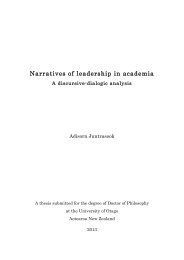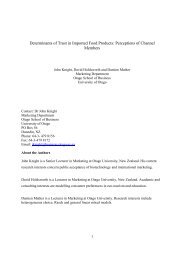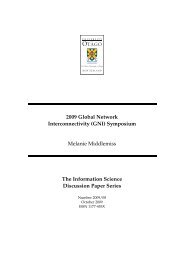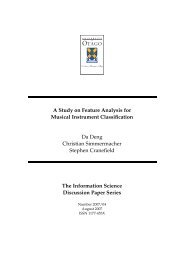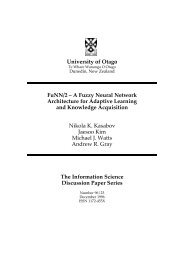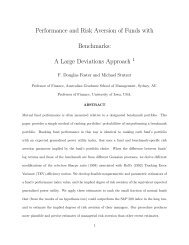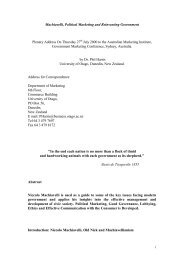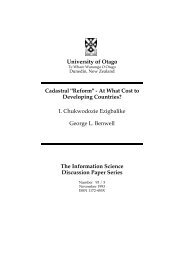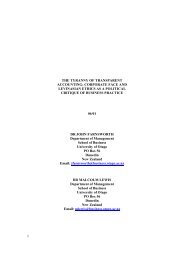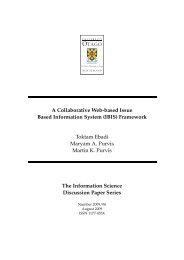Where is R2P grounded in international law? Anne-Marie Judson A ...
Where is R2P grounded in international law? Anne-Marie Judson A ...
Where is R2P grounded in international law? Anne-Marie Judson A ...
You also want an ePaper? Increase the reach of your titles
YUMPU automatically turns print PDFs into web optimized ePapers that Google loves.
egional organ<strong>is</strong>ations as appropriate, should peaceful means be <strong>in</strong>adequate and<br />
national authorities are manifestly fail<strong>in</strong>g to protect their populations from genocide,<br />
war crimes, ethnic cleans<strong>in</strong>g and crimes aga<strong>in</strong>st humanity. Th<strong>is</strong> paragraph shows that<br />
the <strong>in</strong>ternational community <strong>is</strong> legally bound by their duties <strong>in</strong> <strong>in</strong>ternational <strong>law</strong> to<br />
comply with ex<strong>is</strong>t<strong>in</strong>g <strong>in</strong>ternational <strong>law</strong> <strong>in</strong> support<strong>in</strong>g the Security Council with the<br />
means necessary to implement its dec<strong>is</strong>ions when there <strong>is</strong> a threat to <strong>in</strong>ternational<br />
peace and security and action must be taken. It re<strong>in</strong>forces the state’s duties to support<br />
the Security Council <strong>in</strong> its dec<strong>is</strong>ions. As d<strong>is</strong>cussed earlier the Security Council <strong>is</strong><br />
dependent on the states to supply them with the necessary means to carry out its<br />
resolutions <strong>in</strong> the ma<strong>in</strong>tenance of <strong>in</strong>ternational peace and security. If the state refra<strong>in</strong>s<br />
from supply<strong>in</strong>g the Security Council with the necessary means to implement its<br />
dec<strong>is</strong>ions, it could cost lives, lives that could be saved by the state’s duty to provide the<br />
Security Council with what <strong>is</strong> necessary, <strong>in</strong> a ‘timely and dec<strong>is</strong>ive’ manner. The<br />
collective responsibility <strong>is</strong> the duty of all states that are a party to the Charter when<br />
they have chosen pacta sunt servada to be part of the United Nations. They have chosen<br />
to agree to supply the means necessary to the Security Council through sign<strong>in</strong>g the<br />
Charter of the United Nations. Th<strong>is</strong> responsibility has been <strong>in</strong> ex<strong>is</strong>tence s<strong>in</strong>ce 1945.<br />
Paragraph 139 of the 2005 World Summit outcome document stresses the need for<br />
the General Assembly to cont<strong>in</strong>ue consideration of the responsibility to protect<br />
populations from genocide, war crimes, ethnic cleans<strong>in</strong>g and crimes aga<strong>in</strong>st humanity<br />
and its implications, bear<strong>in</strong>g <strong>in</strong> m<strong>in</strong>d the pr<strong>in</strong>ciples of the Charter and <strong>in</strong>ternational<br />
<strong>law</strong>. Once aga<strong>in</strong> th<strong>is</strong> statement directly reflects the obligations that the states already<br />
have <strong>in</strong> <strong>in</strong>ternational <strong>law</strong>. It does not add anyth<strong>in</strong>g new to <strong>in</strong>ternational <strong>law</strong> or to the<br />
states responsibilities that already ex<strong>is</strong>t. It rem<strong>in</strong>ds state’s that they do <strong>in</strong> fact have<br />
duties, responsibilities and obligations <strong>in</strong> <strong>in</strong>ternational <strong>law</strong> that apply to war crimes,<br />
and genocide and therefore crimes aga<strong>in</strong>st humanity and ethnic cleans<strong>in</strong>g, and these<br />
duties provide legal stand<strong>in</strong>g for the Responsibility to Protect <strong>in</strong> <strong>in</strong>ternational <strong>law</strong>.<br />
Lastly paragraph 139 of the 2005 World Summit outcome document states that the<br />
members of the United Nations also <strong>in</strong>tend to commit as necessary, to help<strong>in</strong>g states<br />
build the capacity to protect their populations. F<strong>in</strong>ally th<strong>is</strong> statement adds someth<strong>in</strong>g<br />
new, <strong>in</strong> that each state has a duty to protect its citizens from harm; it has a duty to<br />
work with other states by peaceful means and it has the responsibility not to <strong>in</strong>tervene<br />
<strong>in</strong> the affairs of others except though the approval of the Security Council. It has<br />
<br />
119



